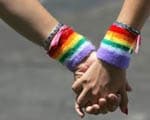Recent research suggests that nearly one in ten teens have same-sex partners - almost twice as many as found in previous studies.

Researchers surveyed more than 17,000 teens in New York City, and 3,805 male and 3,456 female adolescents reported having had sex. It was found that teens who had sex with only their own gender or with both genders were more likely to engage in risky sexual behaviour, putting themselves at higher risk for sexually transmitted diseases (STDs). According to the U.S. Centers for Disease Control and Prevention, half of the 18 million new cases of STDs that occur each year happen among people aged 15 to 24.
Such risky behaviour included not using a condom during sex and having forced sex. More than half of bisexual boys didn't use a condom, compared to a fifth of heterosexual boys. The difference was not quite as large for bisexual and heterosexual girls, but it was similar: About half of bisexual girls didn't use a condom, compared to 30 percent of heterosexual girls. About a third of bisexual teens had forced sex at some point in their lives, much higher than the 6 percent of heterosexual boys and 16 percent of heterosexual girls who had that experience. According to the researchers, these teens may engage in riskier behaviour because sex education programmes don't always acknowledge gay, lesbian, and bisexual relationships.
Educators need to acknowledge gay, lesbian, and bisexual relationships more often in sex education curricula so that teens are more likely to listen and will feel more comfortable discussing any issues. It is clear that some teens are more vulnerable to risky behaviour and STDs than others. It is therefore important that parents, educators, and researchers focus on risky behaviour and not just on sexual identity.
DoctorNDTV is the one stop site for all your health needs providing the most credible health information, health news and tips with expert advice on healthy living, diet plans, informative videos etc. You can get the most relevant and accurate info you need about health problems like diabetes, cancer, pregnancy, HIV and AIDS, weight loss and many other lifestyle diseases. We have a panel of over 350 experts who help us develop content by giving their valuable inputs and bringing to us the latest in the world of healthcare.












